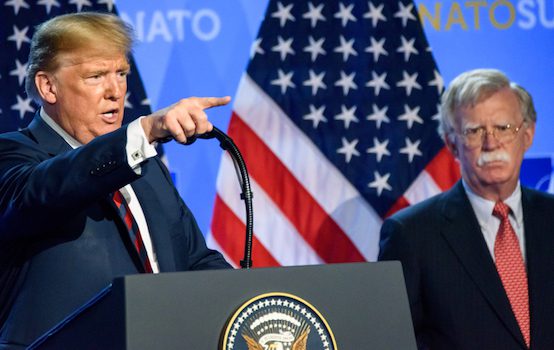Don’t Mention the ‘Red Line’

The framing of this NYT article on Trump and Venezuela is the sort of coverage that reinforces the bias towards action in our foreign policy debates:
During his presidential campaign, Donald Trump often complained about how President Barack Obama drew red lines that he never enforced, and how a diminished America let Russia walk into Syria unchallenged, something he said would not happen if the Russian leader respected the United States president.
Now, in Venezuela, President Trump is facing his own red-line moment — again, with Vladimir V. Putin of Russia.
It’s true that Trump has periodically whined about Obama’s “failure” to back up the so-called “red line” he drew in Syria, but like many other criticisms that he has made of Obama it is mostly an opportunistic dig against his predecessor that doesn’t have to mean anything more than that. I suspect that Trump ordered illegal attacks on Syrian government forces in 2017 and 2018 in large part because it was something that Obama famously chose not to do. If Obama had ordered an attack in 2013, we have to assume that Trump would have ridiculed him for that instead. We have to hope that Trump’s own threats against Russia and Venezuela are nothing more than empty bluster, but as long as he says “all options” are available and he is surrounded by ideologues and hard-liners there is a chance that they might be more than that. That is why it is important not to egg Trump on with nonsense about defending American “credibility.”
Some of his critics will probably be tempted to use Trump’s previous statements about the “red line” against him now to make him look bad, but that would be a mistake. U.S. “credibility” is not in danger if Trump doesn’t back up his reckless Venezuela rhetoric. U.S. interests will definitely be harmed if he chooses to back up that rhetoric with aggressive action. Hawks are always eager to use bogus “credibility” arguments to create excuses for military intervention where no U.S. interests are at stake, and we are already seeing attempts to goad Trump into escalation.
Sanger’s article isn’t helping:
That seemed to set up a test: Would Venezuela be the place where Mr. Trump, who has often seemed willing to tolerate Mr. Putin’s most audacious provocations, finally draws his own red line? And, if so, does he have a plan to enforce it?
If Trump drew a “red line” in Venezuela and enforced it, it would be one of the stupidest things he has done as president. It would be unnecessary and potentially costly, but the downsides of backing up the threat go unmentioned. Sanger’s framing of this “test” makes it seem as if Trump has to confront Russia in Venezuela or the president will have “tolerated” another one of their “provocations.” Everything is set up here to make escalation seem more appealing than it really is.
Steve Chapman draws the right lesson from all this:
The far better option is to stay out of international crises that we lack the responsibility or the ability to control. Maybe someday our presidents will learn that.
In this case, we have to hope that Trump’s boundless capacity for hypocrisy prevents him from feeling compelled to back up threats he shouldn’t have made.
Comments